Mental Health Nursing: Depression Report, Treatment and Symptoms
VerifiedAdded on 2022/10/04
|13
|2961
|469
Report
AI Summary
This report provides a detailed overview of depression, a common and severe mental health illness. It covers various aspects, including the symptoms of depression in different age groups (teens, children, and older adults), the psychopathology of depression, and the psychopharmacology useful for its treatment. The report also discusses different types of psychotherapy, education for patients, and alternative treatment options. The content highlights the importance of understanding depression, recognizing its symptoms, and seeking appropriate treatment through medication, therapy, or alternative methods. The report emphasizes that depression is a treatable illness and underscores the need for comprehensive care to improve the patient's mental well-being.
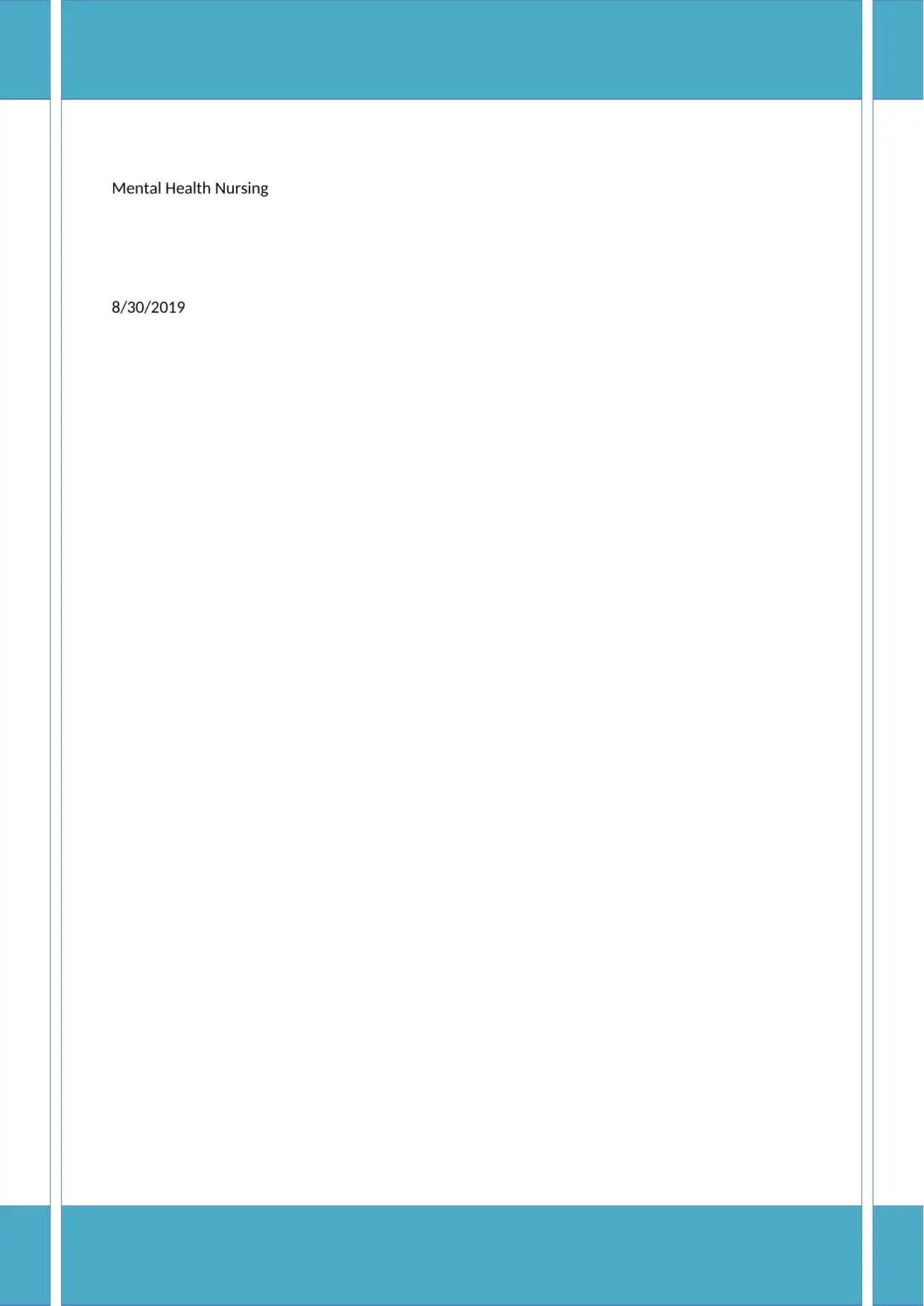
Mental Health Nursing
8/30/2019
8/30/2019
Paraphrase This Document
Need a fresh take? Get an instant paraphrase of this document with our AI Paraphraser
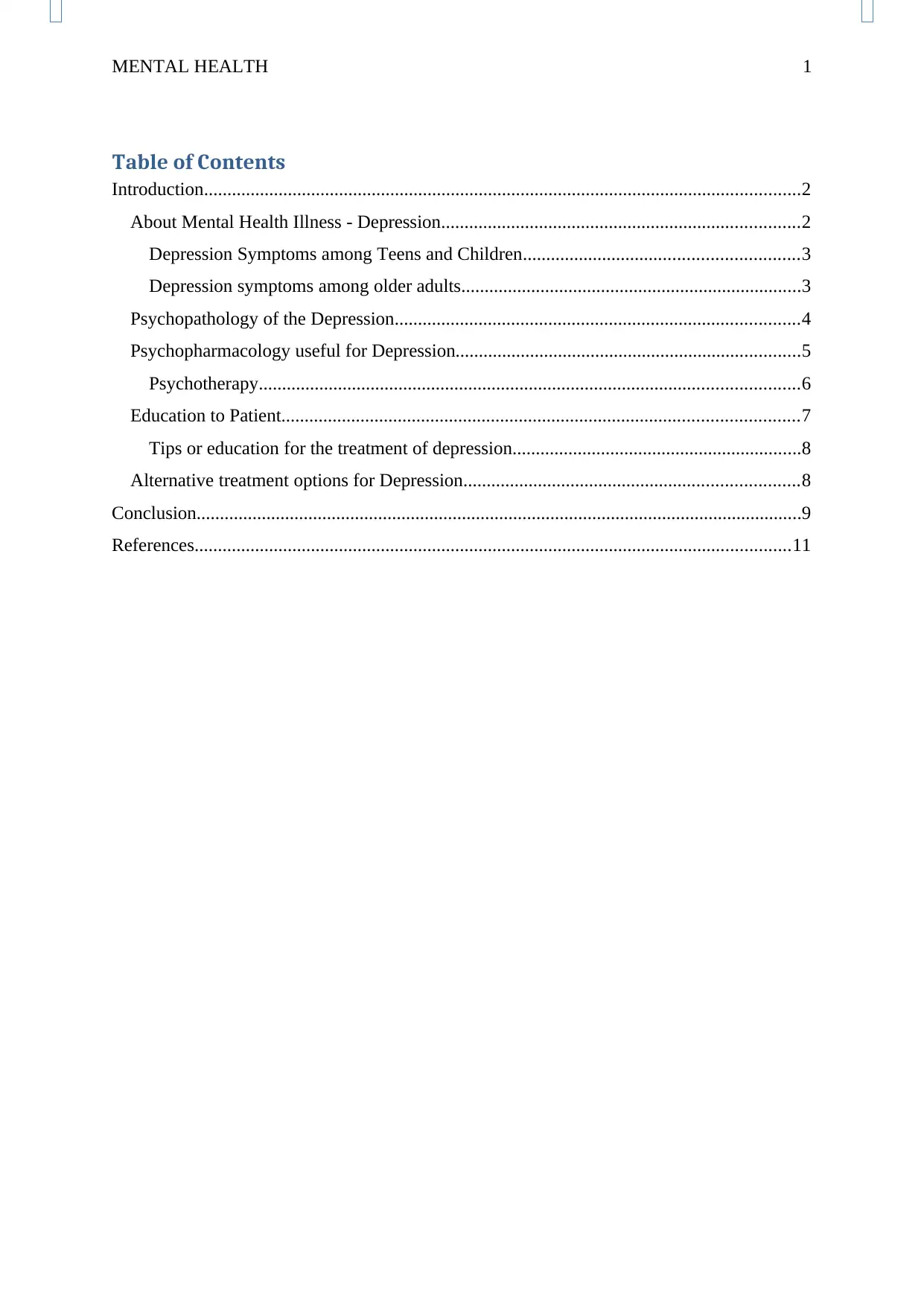
MENTAL HEALTH 1
Table of Contents
Introduction................................................................................................................................2
About Mental Health Illness - Depression.............................................................................2
Depression Symptoms among Teens and Children...........................................................3
Depression symptoms among older adults.........................................................................3
Psychopathology of the Depression.......................................................................................4
Psychopharmacology useful for Depression..........................................................................5
Psychotherapy....................................................................................................................6
Education to Patient...............................................................................................................7
Tips or education for the treatment of depression..............................................................8
Alternative treatment options for Depression........................................................................8
Conclusion..................................................................................................................................9
References................................................................................................................................11
Table of Contents
Introduction................................................................................................................................2
About Mental Health Illness - Depression.............................................................................2
Depression Symptoms among Teens and Children...........................................................3
Depression symptoms among older adults.........................................................................3
Psychopathology of the Depression.......................................................................................4
Psychopharmacology useful for Depression..........................................................................5
Psychotherapy....................................................................................................................6
Education to Patient...............................................................................................................7
Tips or education for the treatment of depression..............................................................8
Alternative treatment options for Depression........................................................................8
Conclusion..................................................................................................................................9
References................................................................................................................................11
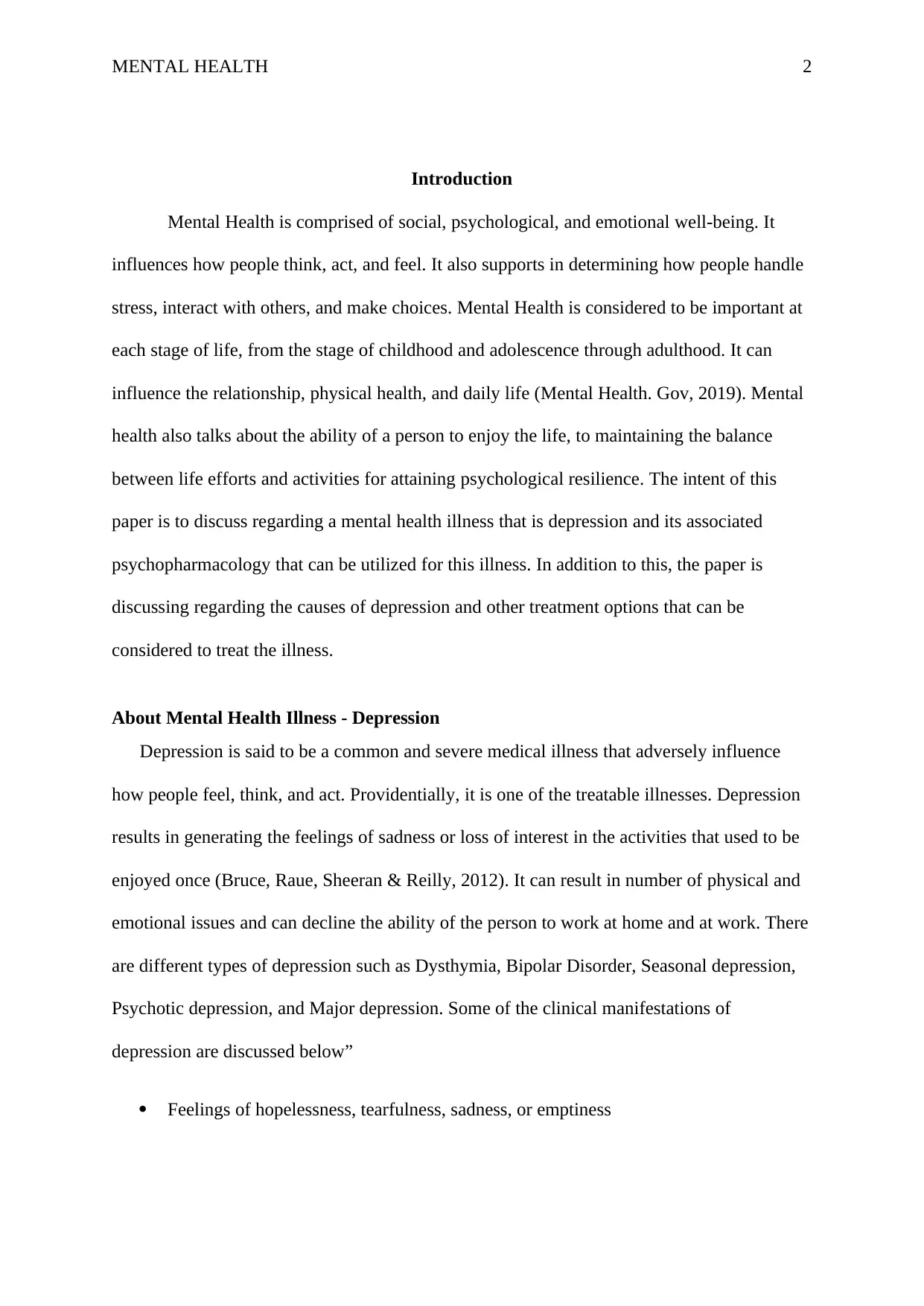
MENTAL HEALTH 2
Introduction
Mental Health is comprised of social, psychological, and emotional well-being. It
influences how people think, act, and feel. It also supports in determining how people handle
stress, interact with others, and make choices. Mental Health is considered to be important at
each stage of life, from the stage of childhood and adolescence through adulthood. It can
influence the relationship, physical health, and daily life (Mental Health. Gov, 2019). Mental
health also talks about the ability of a person to enjoy the life, to maintaining the balance
between life efforts and activities for attaining psychological resilience. The intent of this
paper is to discuss regarding a mental health illness that is depression and its associated
psychopharmacology that can be utilized for this illness. In addition to this, the paper is
discussing regarding the causes of depression and other treatment options that can be
considered to treat the illness.
About Mental Health Illness - Depression
Depression is said to be a common and severe medical illness that adversely influence
how people feel, think, and act. Providentially, it is one of the treatable illnesses. Depression
results in generating the feelings of sadness or loss of interest in the activities that used to be
enjoyed once (Bruce, Raue, Sheeran & Reilly, 2012). It can result in number of physical and
emotional issues and can decline the ability of the person to work at home and at work. There
are different types of depression such as Dysthymia, Bipolar Disorder, Seasonal depression,
Psychotic depression, and Major depression. Some of the clinical manifestations of
depression are discussed below”
Feelings of hopelessness, tearfulness, sadness, or emptiness
Introduction
Mental Health is comprised of social, psychological, and emotional well-being. It
influences how people think, act, and feel. It also supports in determining how people handle
stress, interact with others, and make choices. Mental Health is considered to be important at
each stage of life, from the stage of childhood and adolescence through adulthood. It can
influence the relationship, physical health, and daily life (Mental Health. Gov, 2019). Mental
health also talks about the ability of a person to enjoy the life, to maintaining the balance
between life efforts and activities for attaining psychological resilience. The intent of this
paper is to discuss regarding a mental health illness that is depression and its associated
psychopharmacology that can be utilized for this illness. In addition to this, the paper is
discussing regarding the causes of depression and other treatment options that can be
considered to treat the illness.
About Mental Health Illness - Depression
Depression is said to be a common and severe medical illness that adversely influence
how people feel, think, and act. Providentially, it is one of the treatable illnesses. Depression
results in generating the feelings of sadness or loss of interest in the activities that used to be
enjoyed once (Bruce, Raue, Sheeran & Reilly, 2012). It can result in number of physical and
emotional issues and can decline the ability of the person to work at home and at work. There
are different types of depression such as Dysthymia, Bipolar Disorder, Seasonal depression,
Psychotic depression, and Major depression. Some of the clinical manifestations of
depression are discussed below”
Feelings of hopelessness, tearfulness, sadness, or emptiness
⊘ This is a preview!⊘
Do you want full access?
Subscribe today to unlock all pages.

Trusted by 1+ million students worldwide
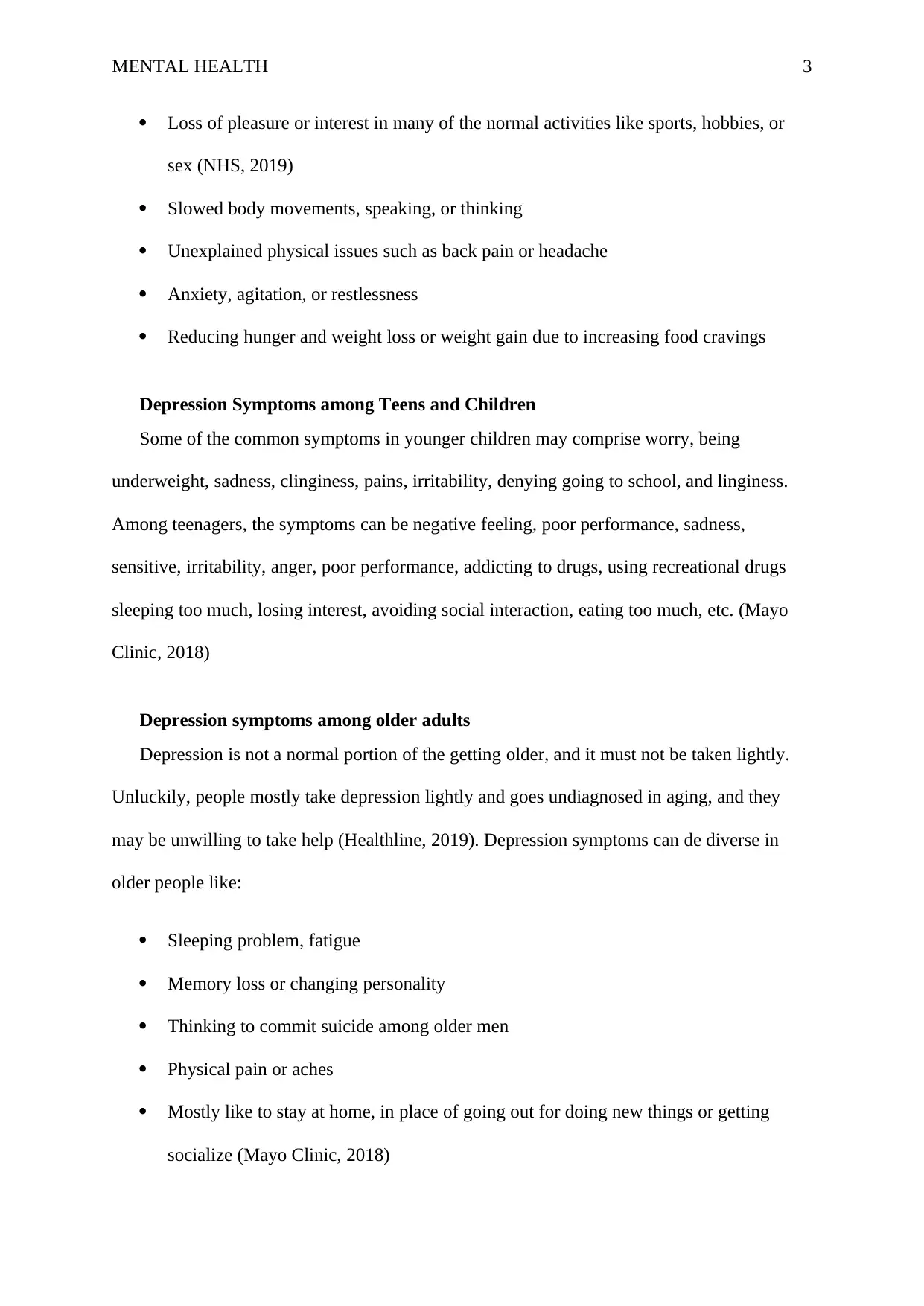
MENTAL HEALTH 3
Loss of pleasure or interest in many of the normal activities like sports, hobbies, or
sex (NHS, 2019)
Slowed body movements, speaking, or thinking
Unexplained physical issues such as back pain or headache
Anxiety, agitation, or restlessness
Reducing hunger and weight loss or weight gain due to increasing food cravings
Depression Symptoms among Teens and Children
Some of the common symptoms in younger children may comprise worry, being
underweight, sadness, clinginess, pains, irritability, denying going to school, and linginess.
Among teenagers, the symptoms can be negative feeling, poor performance, sadness,
sensitive, irritability, anger, poor performance, addicting to drugs, using recreational drugs
sleeping too much, losing interest, avoiding social interaction, eating too much, etc. (Mayo
Clinic, 2018)
Depression symptoms among older adults
Depression is not a normal portion of the getting older, and it must not be taken lightly.
Unluckily, people mostly take depression lightly and goes undiagnosed in aging, and they
may be unwilling to take help (Healthline, 2019). Depression symptoms can de diverse in
older people like:
Sleeping problem, fatigue
Memory loss or changing personality
Thinking to commit suicide among older men
Physical pain or aches
Mostly like to stay at home, in place of going out for doing new things or getting
socialize (Mayo Clinic, 2018)
Loss of pleasure or interest in many of the normal activities like sports, hobbies, or
sex (NHS, 2019)
Slowed body movements, speaking, or thinking
Unexplained physical issues such as back pain or headache
Anxiety, agitation, or restlessness
Reducing hunger and weight loss or weight gain due to increasing food cravings
Depression Symptoms among Teens and Children
Some of the common symptoms in younger children may comprise worry, being
underweight, sadness, clinginess, pains, irritability, denying going to school, and linginess.
Among teenagers, the symptoms can be negative feeling, poor performance, sadness,
sensitive, irritability, anger, poor performance, addicting to drugs, using recreational drugs
sleeping too much, losing interest, avoiding social interaction, eating too much, etc. (Mayo
Clinic, 2018)
Depression symptoms among older adults
Depression is not a normal portion of the getting older, and it must not be taken lightly.
Unluckily, people mostly take depression lightly and goes undiagnosed in aging, and they
may be unwilling to take help (Healthline, 2019). Depression symptoms can de diverse in
older people like:
Sleeping problem, fatigue
Memory loss or changing personality
Thinking to commit suicide among older men
Physical pain or aches
Mostly like to stay at home, in place of going out for doing new things or getting
socialize (Mayo Clinic, 2018)
Paraphrase This Document
Need a fresh take? Get an instant paraphrase of this document with our AI Paraphraser
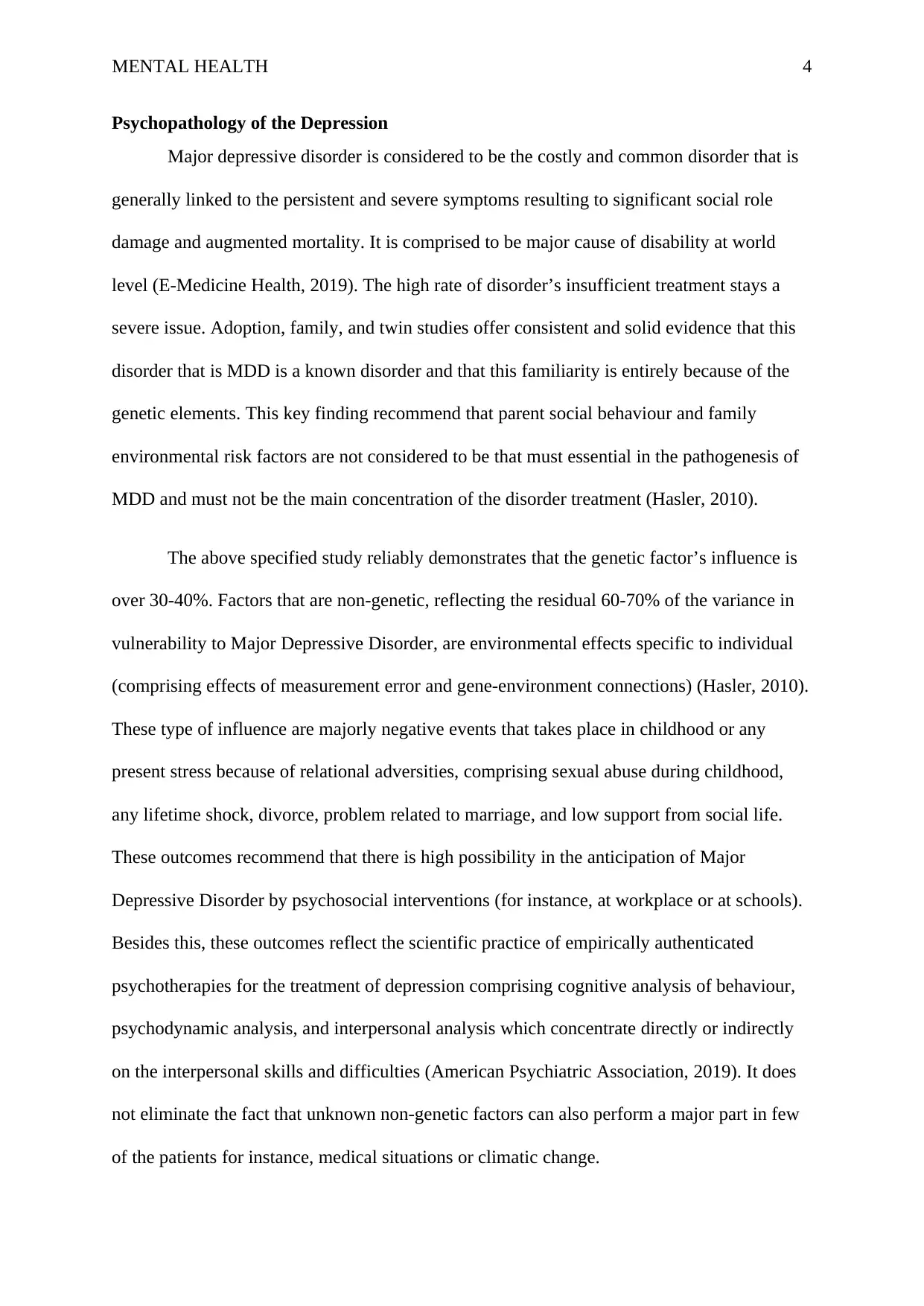
MENTAL HEALTH 4
Psychopathology of the Depression
Major depressive disorder is considered to be the costly and common disorder that is
generally linked to the persistent and severe symptoms resulting to significant social role
damage and augmented mortality. It is comprised to be major cause of disability at world
level (E-Medicine Health, 2019). The high rate of disorder’s insufficient treatment stays a
severe issue. Adoption, family, and twin studies offer consistent and solid evidence that this
disorder that is MDD is a known disorder and that this familiarity is entirely because of the
genetic elements. This key finding recommend that parent social behaviour and family
environmental risk factors are not considered to be that must essential in the pathogenesis of
MDD and must not be the main concentration of the disorder treatment (Hasler, 2010).
The above specified study reliably demonstrates that the genetic factor’s influence is
over 30-40%. Factors that are non-genetic, reflecting the residual 60-70% of the variance in
vulnerability to Major Depressive Disorder, are environmental effects specific to individual
(comprising effects of measurement error and gene-environment connections) (Hasler, 2010).
These type of influence are majorly negative events that takes place in childhood or any
present stress because of relational adversities, comprising sexual abuse during childhood,
any lifetime shock, divorce, problem related to marriage, and low support from social life.
These outcomes recommend that there is high possibility in the anticipation of Major
Depressive Disorder by psychosocial interventions (for instance, at workplace or at schools).
Besides this, these outcomes reflect the scientific practice of empirically authenticated
psychotherapies for the treatment of depression comprising cognitive analysis of behaviour,
psychodynamic analysis, and interpersonal analysis which concentrate directly or indirectly
on the interpersonal skills and difficulties (American Psychiatric Association, 2019). It does
not eliminate the fact that unknown non-genetic factors can also perform a major part in few
of the patients for instance, medical situations or climatic change.
Psychopathology of the Depression
Major depressive disorder is considered to be the costly and common disorder that is
generally linked to the persistent and severe symptoms resulting to significant social role
damage and augmented mortality. It is comprised to be major cause of disability at world
level (E-Medicine Health, 2019). The high rate of disorder’s insufficient treatment stays a
severe issue. Adoption, family, and twin studies offer consistent and solid evidence that this
disorder that is MDD is a known disorder and that this familiarity is entirely because of the
genetic elements. This key finding recommend that parent social behaviour and family
environmental risk factors are not considered to be that must essential in the pathogenesis of
MDD and must not be the main concentration of the disorder treatment (Hasler, 2010).
The above specified study reliably demonstrates that the genetic factor’s influence is
over 30-40%. Factors that are non-genetic, reflecting the residual 60-70% of the variance in
vulnerability to Major Depressive Disorder, are environmental effects specific to individual
(comprising effects of measurement error and gene-environment connections) (Hasler, 2010).
These type of influence are majorly negative events that takes place in childhood or any
present stress because of relational adversities, comprising sexual abuse during childhood,
any lifetime shock, divorce, problem related to marriage, and low support from social life.
These outcomes recommend that there is high possibility in the anticipation of Major
Depressive Disorder by psychosocial interventions (for instance, at workplace or at schools).
Besides this, these outcomes reflect the scientific practice of empirically authenticated
psychotherapies for the treatment of depression comprising cognitive analysis of behaviour,
psychodynamic analysis, and interpersonal analysis which concentrate directly or indirectly
on the interpersonal skills and difficulties (American Psychiatric Association, 2019). It does
not eliminate the fact that unknown non-genetic factors can also perform a major part in few
of the patients for instance, medical situations or climatic change.
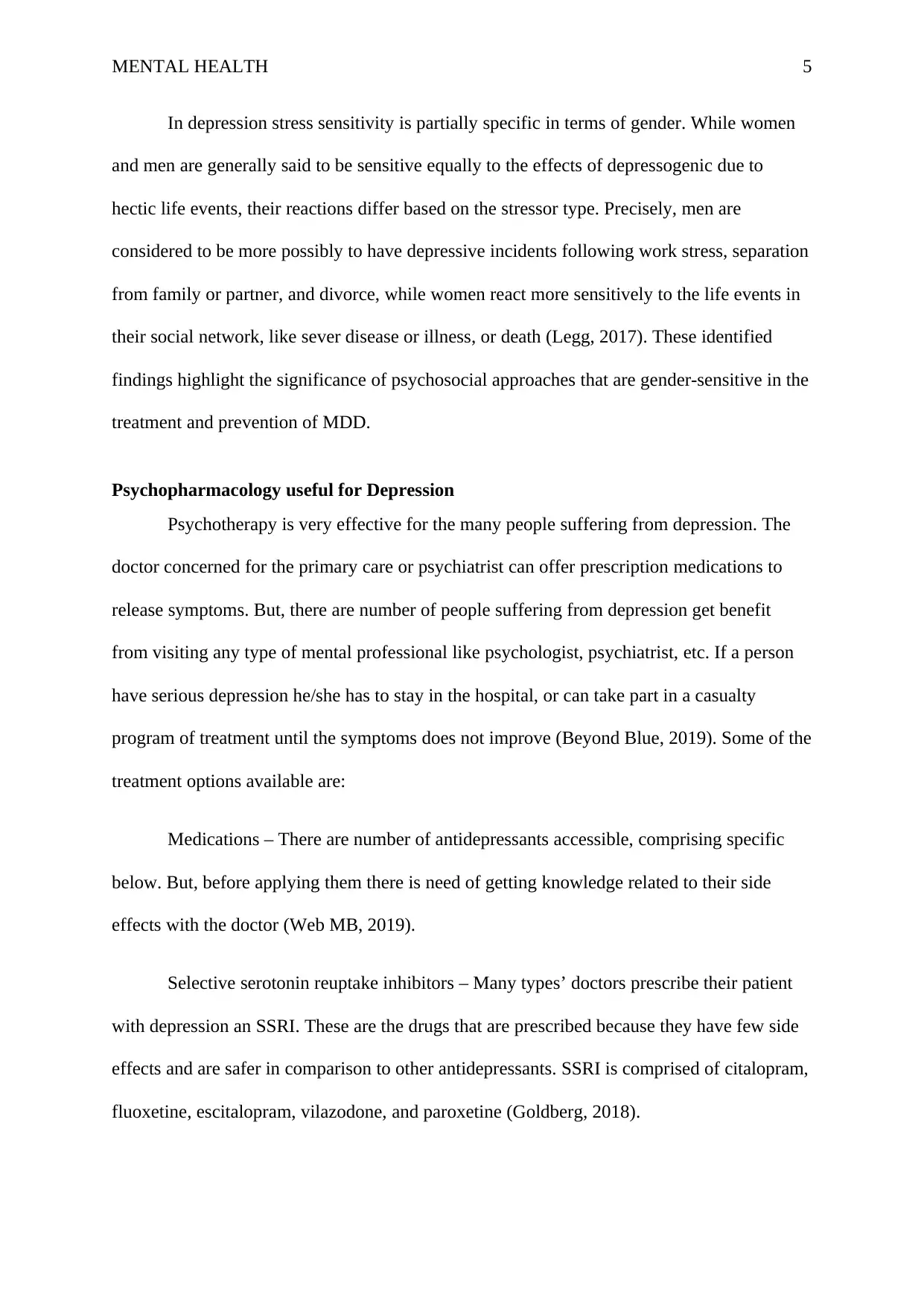
MENTAL HEALTH 5
In depression stress sensitivity is partially specific in terms of gender. While women
and men are generally said to be sensitive equally to the effects of depressogenic due to
hectic life events, their reactions differ based on the stressor type. Precisely, men are
considered to be more possibly to have depressive incidents following work stress, separation
from family or partner, and divorce, while women react more sensitively to the life events in
their social network, like sever disease or illness, or death (Legg, 2017). These identified
findings highlight the significance of psychosocial approaches that are gender-sensitive in the
treatment and prevention of MDD.
Psychopharmacology useful for Depression
Psychotherapy is very effective for the many people suffering from depression. The
doctor concerned for the primary care or psychiatrist can offer prescription medications to
release symptoms. But, there are number of people suffering from depression get benefit
from visiting any type of mental professional like psychologist, psychiatrist, etc. If a person
have serious depression he/she has to stay in the hospital, or can take part in a casualty
program of treatment until the symptoms does not improve (Beyond Blue, 2019). Some of the
treatment options available are:
Medications – There are number of antidepressants accessible, comprising specific
below. But, before applying them there is need of getting knowledge related to their side
effects with the doctor (Web MB, 2019).
Selective serotonin reuptake inhibitors – Many types’ doctors prescribe their patient
with depression an SSRI. These are the drugs that are prescribed because they have few side
effects and are safer in comparison to other antidepressants. SSRI is comprised of citalopram,
fluoxetine, escitalopram, vilazodone, and paroxetine (Goldberg, 2018).
In depression stress sensitivity is partially specific in terms of gender. While women
and men are generally said to be sensitive equally to the effects of depressogenic due to
hectic life events, their reactions differ based on the stressor type. Precisely, men are
considered to be more possibly to have depressive incidents following work stress, separation
from family or partner, and divorce, while women react more sensitively to the life events in
their social network, like sever disease or illness, or death (Legg, 2017). These identified
findings highlight the significance of psychosocial approaches that are gender-sensitive in the
treatment and prevention of MDD.
Psychopharmacology useful for Depression
Psychotherapy is very effective for the many people suffering from depression. The
doctor concerned for the primary care or psychiatrist can offer prescription medications to
release symptoms. But, there are number of people suffering from depression get benefit
from visiting any type of mental professional like psychologist, psychiatrist, etc. If a person
have serious depression he/she has to stay in the hospital, or can take part in a casualty
program of treatment until the symptoms does not improve (Beyond Blue, 2019). Some of the
treatment options available are:
Medications – There are number of antidepressants accessible, comprising specific
below. But, before applying them there is need of getting knowledge related to their side
effects with the doctor (Web MB, 2019).
Selective serotonin reuptake inhibitors – Many types’ doctors prescribe their patient
with depression an SSRI. These are the drugs that are prescribed because they have few side
effects and are safer in comparison to other antidepressants. SSRI is comprised of citalopram,
fluoxetine, escitalopram, vilazodone, and paroxetine (Goldberg, 2018).
⊘ This is a preview!⊘
Do you want full access?
Subscribe today to unlock all pages.

Trusted by 1+ million students worldwide
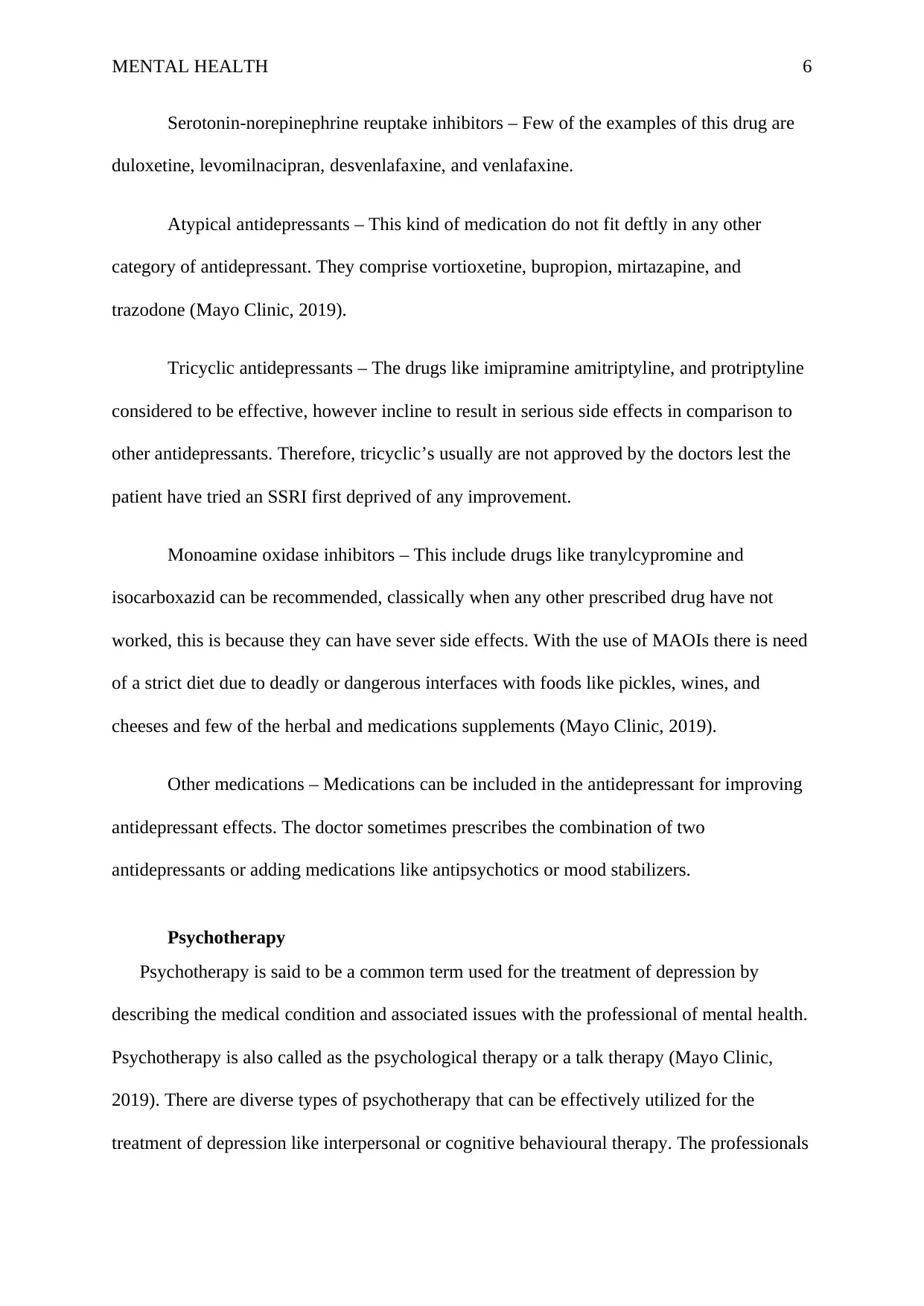
MENTAL HEALTH 6
Serotonin-norepinephrine reuptake inhibitors – Few of the examples of this drug are
duloxetine, levomilnacipran, desvenlafaxine, and venlafaxine.
Atypical antidepressants – This kind of medication do not fit deftly in any other
category of antidepressant. They comprise vortioxetine, bupropion, mirtazapine, and
trazodone (Mayo Clinic, 2019).
Tricyclic antidepressants – The drugs like imipramine amitriptyline, and protriptyline
considered to be effective, however incline to result in serious side effects in comparison to
other antidepressants. Therefore, tricyclic’s usually are not approved by the doctors lest the
patient have tried an SSRI first deprived of any improvement.
Monoamine oxidase inhibitors – This include drugs like tranylcypromine and
isocarboxazid can be recommended, classically when any other prescribed drug have not
worked, this is because they can have sever side effects. With the use of MAOIs there is need
of a strict diet due to deadly or dangerous interfaces with foods like pickles, wines, and
cheeses and few of the herbal and medications supplements (Mayo Clinic, 2019).
Other medications – Medications can be included in the antidepressant for improving
antidepressant effects. The doctor sometimes prescribes the combination of two
antidepressants or adding medications like antipsychotics or mood stabilizers.
Psychotherapy
Psychotherapy is said to be a common term used for the treatment of depression by
describing the medical condition and associated issues with the professional of mental health.
Psychotherapy is also called as the psychological therapy or a talk therapy (Mayo Clinic,
2019). There are diverse types of psychotherapy that can be effectively utilized for the
treatment of depression like interpersonal or cognitive behavioural therapy. The professionals
Serotonin-norepinephrine reuptake inhibitors – Few of the examples of this drug are
duloxetine, levomilnacipran, desvenlafaxine, and venlafaxine.
Atypical antidepressants – This kind of medication do not fit deftly in any other
category of antidepressant. They comprise vortioxetine, bupropion, mirtazapine, and
trazodone (Mayo Clinic, 2019).
Tricyclic antidepressants – The drugs like imipramine amitriptyline, and protriptyline
considered to be effective, however incline to result in serious side effects in comparison to
other antidepressants. Therefore, tricyclic’s usually are not approved by the doctors lest the
patient have tried an SSRI first deprived of any improvement.
Monoamine oxidase inhibitors – This include drugs like tranylcypromine and
isocarboxazid can be recommended, classically when any other prescribed drug have not
worked, this is because they can have sever side effects. With the use of MAOIs there is need
of a strict diet due to deadly or dangerous interfaces with foods like pickles, wines, and
cheeses and few of the herbal and medications supplements (Mayo Clinic, 2019).
Other medications – Medications can be included in the antidepressant for improving
antidepressant effects. The doctor sometimes prescribes the combination of two
antidepressants or adding medications like antipsychotics or mood stabilizers.
Psychotherapy
Psychotherapy is said to be a common term used for the treatment of depression by
describing the medical condition and associated issues with the professional of mental health.
Psychotherapy is also called as the psychological therapy or a talk therapy (Mayo Clinic,
2019). There are diverse types of psychotherapy that can be effectively utilized for the
treatment of depression like interpersonal or cognitive behavioural therapy. The professionals
Paraphrase This Document
Need a fresh take? Get an instant paraphrase of this document with our AI Paraphraser
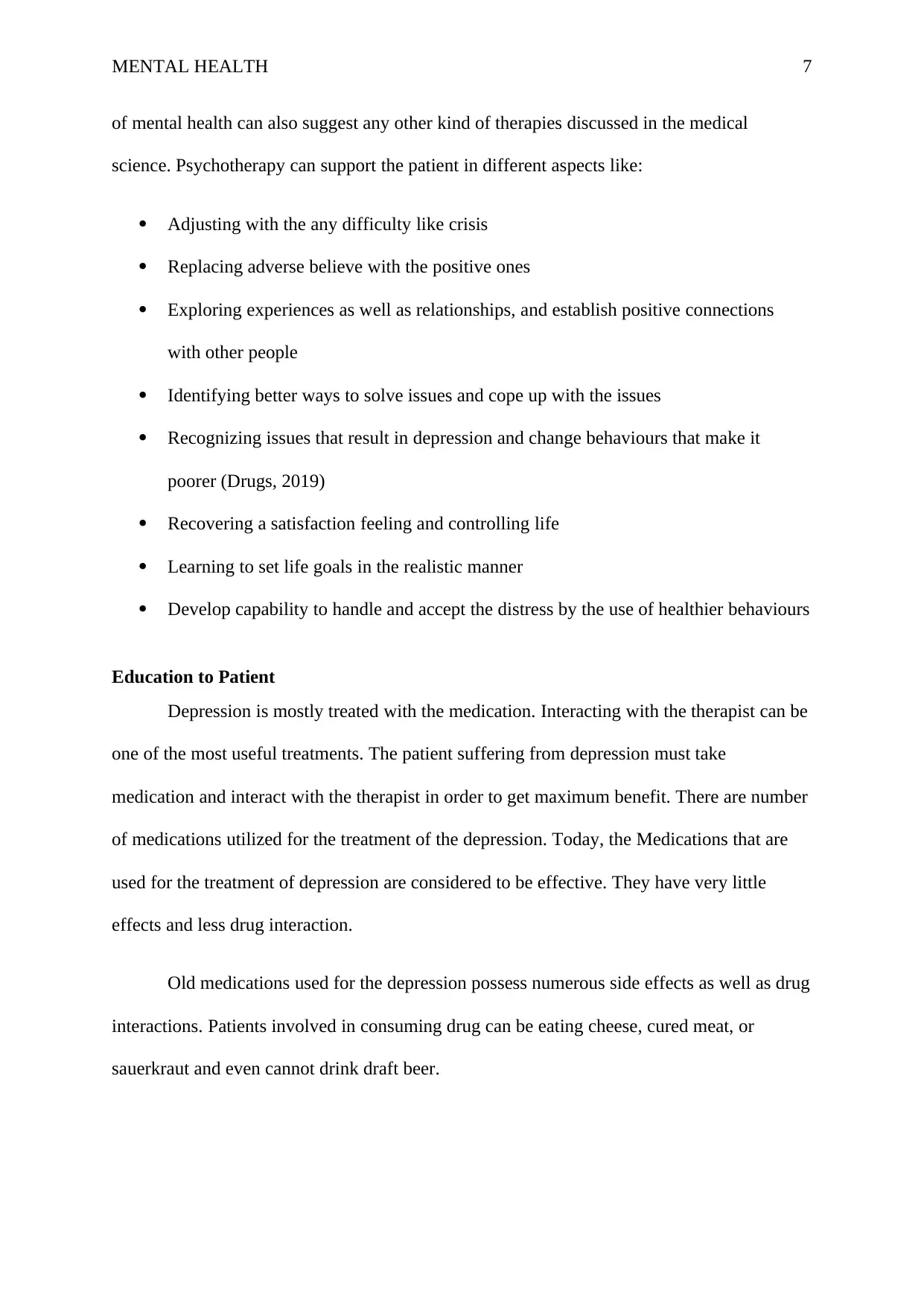
MENTAL HEALTH 7
of mental health can also suggest any other kind of therapies discussed in the medical
science. Psychotherapy can support the patient in different aspects like:
Adjusting with the any difficulty like crisis
Replacing adverse believe with the positive ones
Exploring experiences as well as relationships, and establish positive connections
with other people
Identifying better ways to solve issues and cope up with the issues
Recognizing issues that result in depression and change behaviours that make it
poorer (Drugs, 2019)
Recovering a satisfaction feeling and controlling life
Learning to set life goals in the realistic manner
Develop capability to handle and accept the distress by the use of healthier behaviours
Education to Patient
Depression is mostly treated with the medication. Interacting with the therapist can be
one of the most useful treatments. The patient suffering from depression must take
medication and interact with the therapist in order to get maximum benefit. There are number
of medications utilized for the treatment of the depression. Today, the Medications that are
used for the treatment of depression are considered to be effective. They have very little
effects and less drug interaction.
Old medications used for the depression possess numerous side effects as well as drug
interactions. Patients involved in consuming drug can be eating cheese, cured meat, or
sauerkraut and even cannot drink draft beer.
of mental health can also suggest any other kind of therapies discussed in the medical
science. Psychotherapy can support the patient in different aspects like:
Adjusting with the any difficulty like crisis
Replacing adverse believe with the positive ones
Exploring experiences as well as relationships, and establish positive connections
with other people
Identifying better ways to solve issues and cope up with the issues
Recognizing issues that result in depression and change behaviours that make it
poorer (Drugs, 2019)
Recovering a satisfaction feeling and controlling life
Learning to set life goals in the realistic manner
Develop capability to handle and accept the distress by the use of healthier behaviours
Education to Patient
Depression is mostly treated with the medication. Interacting with the therapist can be
one of the most useful treatments. The patient suffering from depression must take
medication and interact with the therapist in order to get maximum benefit. There are number
of medications utilized for the treatment of the depression. Today, the Medications that are
used for the treatment of depression are considered to be effective. They have very little
effects and less drug interaction.
Old medications used for the depression possess numerous side effects as well as drug
interactions. Patients involved in consuming drug can be eating cheese, cured meat, or
sauerkraut and even cannot drink draft beer.
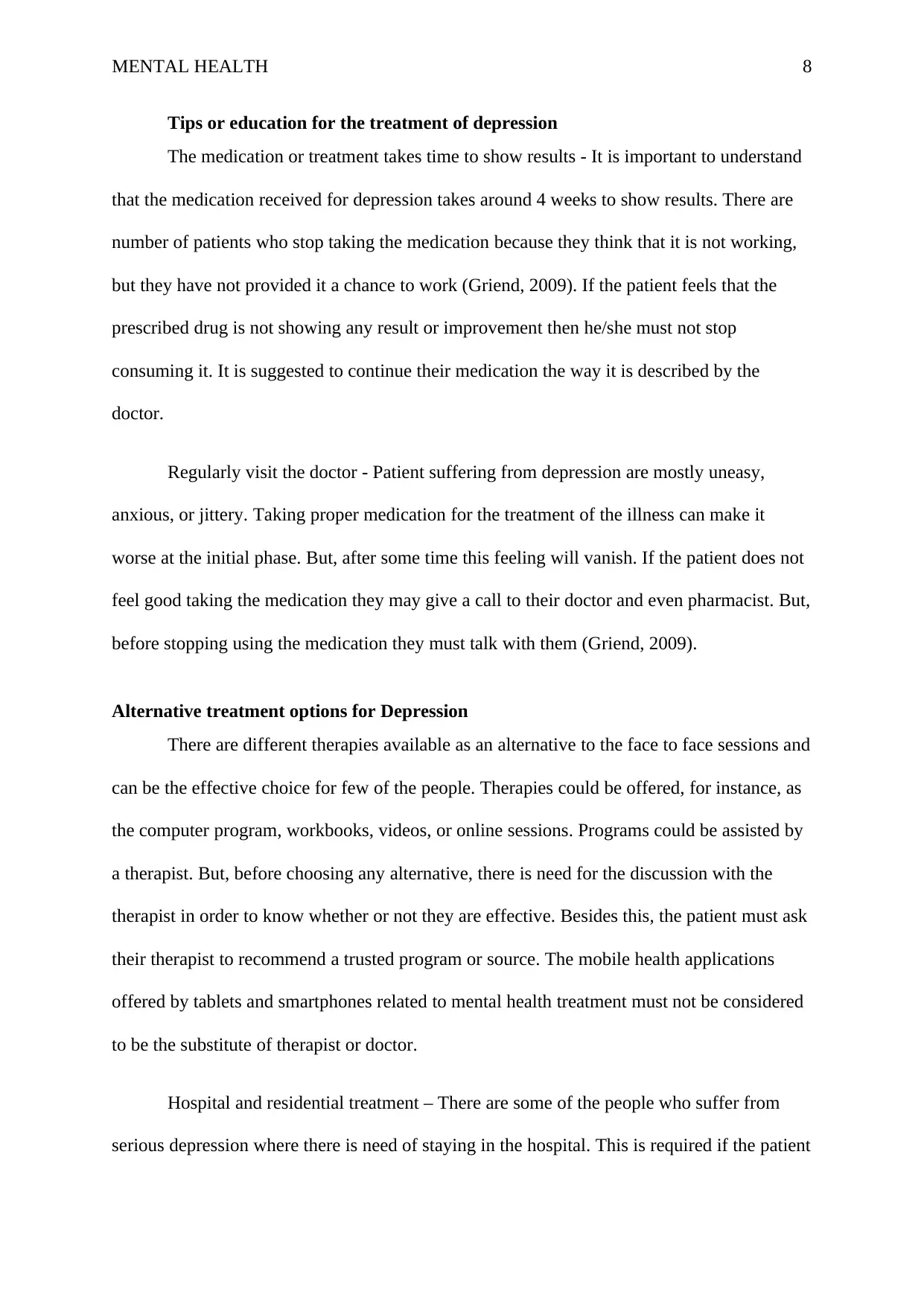
MENTAL HEALTH 8
Tips or education for the treatment of depression
The medication or treatment takes time to show results - It is important to understand
that the medication received for depression takes around 4 weeks to show results. There are
number of patients who stop taking the medication because they think that it is not working,
but they have not provided it a chance to work (Griend, 2009). If the patient feels that the
prescribed drug is not showing any result or improvement then he/she must not stop
consuming it. It is suggested to continue their medication the way it is described by the
doctor.
Regularly visit the doctor - Patient suffering from depression are mostly uneasy,
anxious, or jittery. Taking proper medication for the treatment of the illness can make it
worse at the initial phase. But, after some time this feeling will vanish. If the patient does not
feel good taking the medication they may give a call to their doctor and even pharmacist. But,
before stopping using the medication they must talk with them (Griend, 2009).
Alternative treatment options for Depression
There are different therapies available as an alternative to the face to face sessions and
can be the effective choice for few of the people. Therapies could be offered, for instance, as
the computer program, workbooks, videos, or online sessions. Programs could be assisted by
a therapist. But, before choosing any alternative, there is need for the discussion with the
therapist in order to know whether or not they are effective. Besides this, the patient must ask
their therapist to recommend a trusted program or source. The mobile health applications
offered by tablets and smartphones related to mental health treatment must not be considered
to be the substitute of therapist or doctor.
Hospital and residential treatment – There are some of the people who suffer from
serious depression where there is need of staying in the hospital. This is required if the patient
Tips or education for the treatment of depression
The medication or treatment takes time to show results - It is important to understand
that the medication received for depression takes around 4 weeks to show results. There are
number of patients who stop taking the medication because they think that it is not working,
but they have not provided it a chance to work (Griend, 2009). If the patient feels that the
prescribed drug is not showing any result or improvement then he/she must not stop
consuming it. It is suggested to continue their medication the way it is described by the
doctor.
Regularly visit the doctor - Patient suffering from depression are mostly uneasy,
anxious, or jittery. Taking proper medication for the treatment of the illness can make it
worse at the initial phase. But, after some time this feeling will vanish. If the patient does not
feel good taking the medication they may give a call to their doctor and even pharmacist. But,
before stopping using the medication they must talk with them (Griend, 2009).
Alternative treatment options for Depression
There are different therapies available as an alternative to the face to face sessions and
can be the effective choice for few of the people. Therapies could be offered, for instance, as
the computer program, workbooks, videos, or online sessions. Programs could be assisted by
a therapist. But, before choosing any alternative, there is need for the discussion with the
therapist in order to know whether or not they are effective. Besides this, the patient must ask
their therapist to recommend a trusted program or source. The mobile health applications
offered by tablets and smartphones related to mental health treatment must not be considered
to be the substitute of therapist or doctor.
Hospital and residential treatment – There are some of the people who suffer from
serious depression where there is need of staying in the hospital. This is required if the patient
⊘ This is a preview!⊘
Do you want full access?
Subscribe today to unlock all pages.

Trusted by 1+ million students worldwide
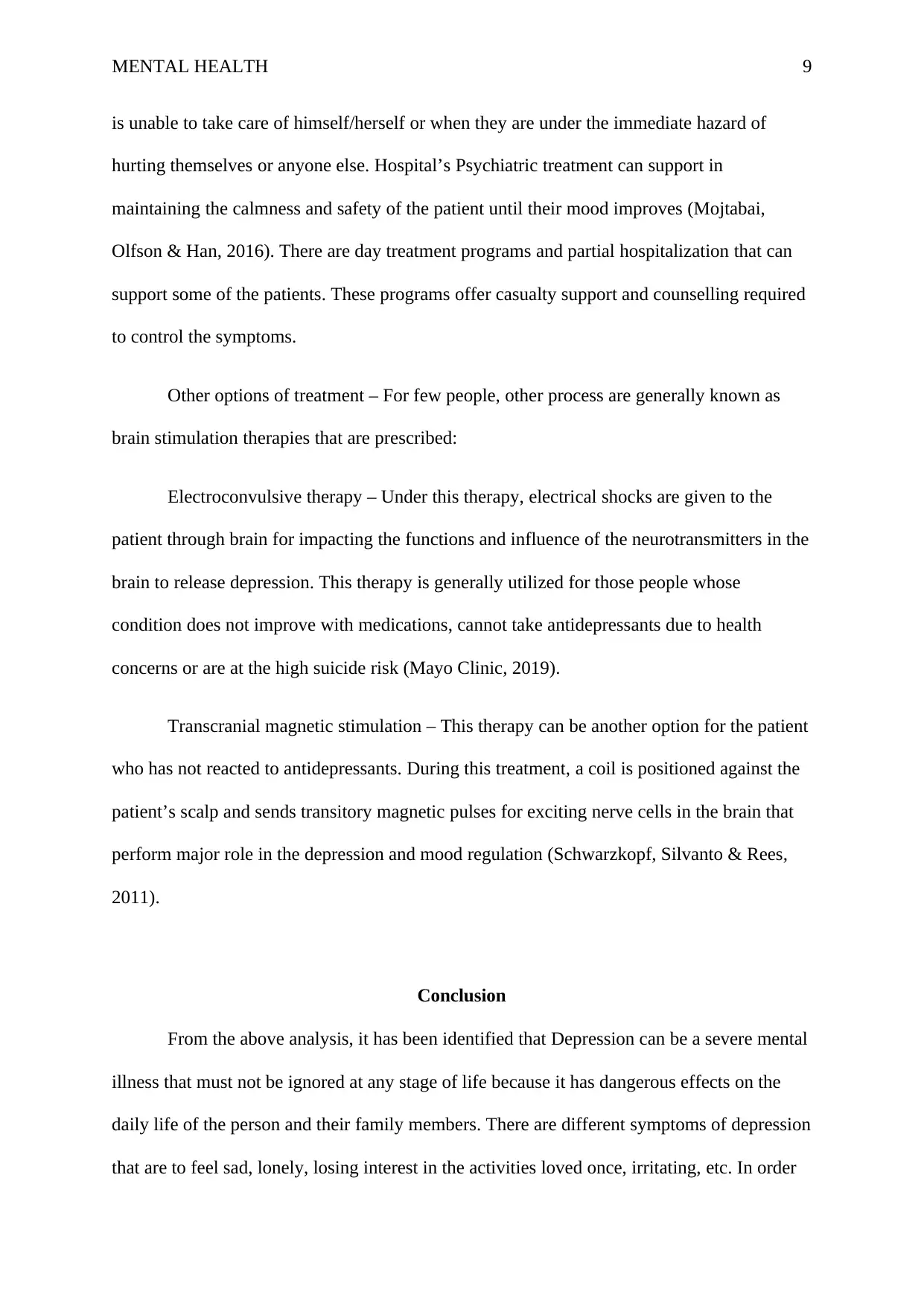
MENTAL HEALTH 9
is unable to take care of himself/herself or when they are under the immediate hazard of
hurting themselves or anyone else. Hospital’s Psychiatric treatment can support in
maintaining the calmness and safety of the patient until their mood improves (Mojtabai,
Olfson & Han, 2016). There are day treatment programs and partial hospitalization that can
support some of the patients. These programs offer casualty support and counselling required
to control the symptoms.
Other options of treatment – For few people, other process are generally known as
brain stimulation therapies that are prescribed:
Electroconvulsive therapy – Under this therapy, electrical shocks are given to the
patient through brain for impacting the functions and influence of the neurotransmitters in the
brain to release depression. This therapy is generally utilized for those people whose
condition does not improve with medications, cannot take antidepressants due to health
concerns or are at the high suicide risk (Mayo Clinic, 2019).
Transcranial magnetic stimulation – This therapy can be another option for the patient
who has not reacted to antidepressants. During this treatment, a coil is positioned against the
patient’s scalp and sends transitory magnetic pulses for exciting nerve cells in the brain that
perform major role in the depression and mood regulation (Schwarzkopf, Silvanto & Rees,
2011).
Conclusion
From the above analysis, it has been identified that Depression can be a severe mental
illness that must not be ignored at any stage of life because it has dangerous effects on the
daily life of the person and their family members. There are different symptoms of depression
that are to feel sad, lonely, losing interest in the activities loved once, irritating, etc. In order
is unable to take care of himself/herself or when they are under the immediate hazard of
hurting themselves or anyone else. Hospital’s Psychiatric treatment can support in
maintaining the calmness and safety of the patient until their mood improves (Mojtabai,
Olfson & Han, 2016). There are day treatment programs and partial hospitalization that can
support some of the patients. These programs offer casualty support and counselling required
to control the symptoms.
Other options of treatment – For few people, other process are generally known as
brain stimulation therapies that are prescribed:
Electroconvulsive therapy – Under this therapy, electrical shocks are given to the
patient through brain for impacting the functions and influence of the neurotransmitters in the
brain to release depression. This therapy is generally utilized for those people whose
condition does not improve with medications, cannot take antidepressants due to health
concerns or are at the high suicide risk (Mayo Clinic, 2019).
Transcranial magnetic stimulation – This therapy can be another option for the patient
who has not reacted to antidepressants. During this treatment, a coil is positioned against the
patient’s scalp and sends transitory magnetic pulses for exciting nerve cells in the brain that
perform major role in the depression and mood regulation (Schwarzkopf, Silvanto & Rees,
2011).
Conclusion
From the above analysis, it has been identified that Depression can be a severe mental
illness that must not be ignored at any stage of life because it has dangerous effects on the
daily life of the person and their family members. There are different symptoms of depression
that are to feel sad, lonely, losing interest in the activities loved once, irritating, etc. In order
Paraphrase This Document
Need a fresh take? Get an instant paraphrase of this document with our AI Paraphraser
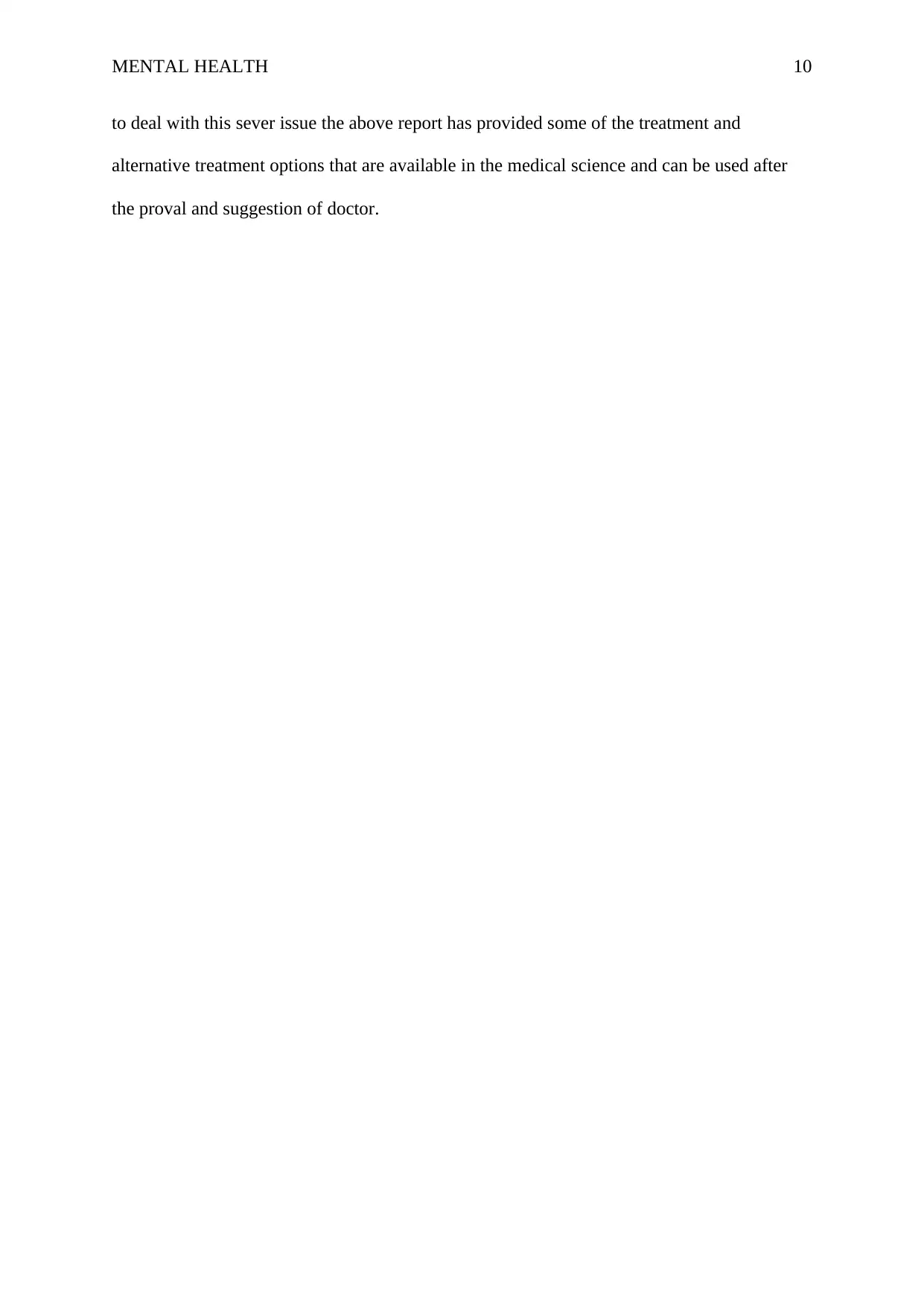
MENTAL HEALTH 10
to deal with this sever issue the above report has provided some of the treatment and
alternative treatment options that are available in the medical science and can be used after
the proval and suggestion of doctor.
to deal with this sever issue the above report has provided some of the treatment and
alternative treatment options that are available in the medical science and can be used after
the proval and suggestion of doctor.
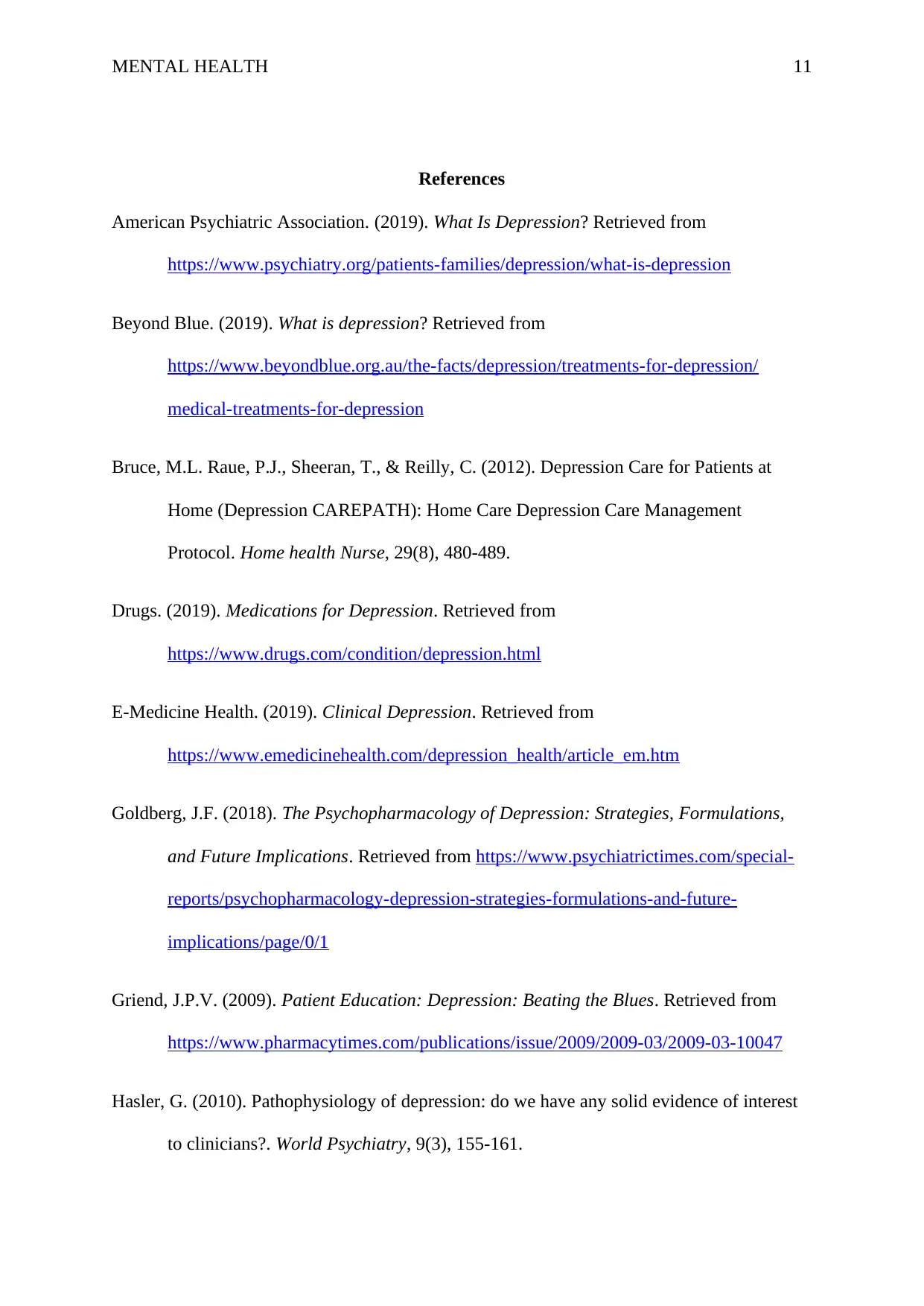
MENTAL HEALTH 11
References
American Psychiatric Association. (2019). What Is Depression? Retrieved from
https://www.psychiatry.org/patients-families/depression/what-is-depression
Beyond Blue. (2019). What is depression? Retrieved from
https://www.beyondblue.org.au/the-facts/depression/treatments-for-depression/
medical-treatments-for-depression
Bruce, M.L. Raue, P.J., Sheeran, T., & Reilly, C. (2012). Depression Care for Patients at
Home (Depression CAREPATH): Home Care Depression Care Management
Protocol. Home health Nurse, 29(8), 480-489.
Drugs. (2019). Medications for Depression. Retrieved from
https://www.drugs.com/condition/depression.html
E-Medicine Health. (2019). Clinical Depression. Retrieved from
https://www.emedicinehealth.com/depression_health/article_em.htm
Goldberg, J.F. (2018). The Psychopharmacology of Depression: Strategies, Formulations,
and Future Implications. Retrieved from https://www.psychiatrictimes.com/special-
reports/psychopharmacology-depression-strategies-formulations-and-future-
implications/page/0/1
Griend, J.P.V. (2009). Patient Education: Depression: Beating the Blues. Retrieved from
https://www.pharmacytimes.com/publications/issue/2009/2009-03/2009-03-10047
Hasler, G. (2010). Pathophysiology of depression: do we have any solid evidence of interest
to clinicians?. World Psychiatry, 9(3), 155-161.
References
American Psychiatric Association. (2019). What Is Depression? Retrieved from
https://www.psychiatry.org/patients-families/depression/what-is-depression
Beyond Blue. (2019). What is depression? Retrieved from
https://www.beyondblue.org.au/the-facts/depression/treatments-for-depression/
medical-treatments-for-depression
Bruce, M.L. Raue, P.J., Sheeran, T., & Reilly, C. (2012). Depression Care for Patients at
Home (Depression CAREPATH): Home Care Depression Care Management
Protocol. Home health Nurse, 29(8), 480-489.
Drugs. (2019). Medications for Depression. Retrieved from
https://www.drugs.com/condition/depression.html
E-Medicine Health. (2019). Clinical Depression. Retrieved from
https://www.emedicinehealth.com/depression_health/article_em.htm
Goldberg, J.F. (2018). The Psychopharmacology of Depression: Strategies, Formulations,
and Future Implications. Retrieved from https://www.psychiatrictimes.com/special-
reports/psychopharmacology-depression-strategies-formulations-and-future-
implications/page/0/1
Griend, J.P.V. (2009). Patient Education: Depression: Beating the Blues. Retrieved from
https://www.pharmacytimes.com/publications/issue/2009/2009-03/2009-03-10047
Hasler, G. (2010). Pathophysiology of depression: do we have any solid evidence of interest
to clinicians?. World Psychiatry, 9(3), 155-161.
⊘ This is a preview!⊘
Do you want full access?
Subscribe today to unlock all pages.

Trusted by 1+ million students worldwide
1 out of 13
Related Documents
Your All-in-One AI-Powered Toolkit for Academic Success.
+13062052269
info@desklib.com
Available 24*7 on WhatsApp / Email
![[object Object]](/_next/static/media/star-bottom.7253800d.svg)
Unlock your academic potential
Copyright © 2020–2026 A2Z Services. All Rights Reserved. Developed and managed by ZUCOL.





